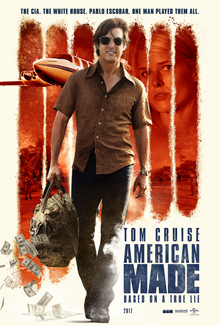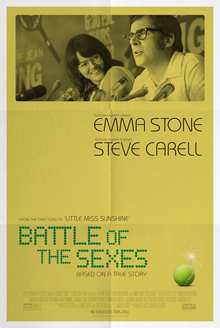Nothing really connects these two films other than the old “based on a true story” moniker, but they did go wide the same day, so here we are. I wanted to like them; I tried, but…
Directed by Doug Liman
Written by Gary Spinelli
Cast: Tom Cruise, Domhnall Gleeson, Sarah Wright, Jesse Plemons, Caleb Landry Jones, Lola Kirke, Jayma Mays, Alejandro Edda, Benito Martinez, E. Roger Mitchell, Jed Rees, Jayson Warner Smith, William Mark McCullough, Mickey Sumner
Soundtrack: Christophe Beck
The last time Tom Cruise and Doug Liman got together resulted in one of the best action movies of the new millennium, so I had reasonably high expectations going into this one.
Unfortunately, my hopes were dashed fairly quickly.
For one thing, somebody decided it would be a good idea to shoot American Made like a Duplass Brothers film (complete with annoying snap zooms), which, for the life of me, I cannot understand, anymore than I can understand all of the praise for Tom Cruise that I’ve been seeing. I mean, I like Tom. He still does great movies from time to time (mostly of the Mission: Impossible variety, but that’s fine), but boy oh boy can he not pull off even the slightest of accents.
Really though, these are just nitpicks compared to the bigger issues.
There are two fatal flaws with American Made. One, despite the “based on a true story” label, the movie is severely lacking in verisimilitude, especially in the performances (and I mean across the board), and, two, we’ve seen this kind of story done better already, and in particular I mean Blow. I’ve said it before, I’ll say it again, I don’t mind if you play fast and loose with the truth, but the movie better be interesting and at least feel real within the world of the story, and American Made largely fails at both.
This is not to say it’s entirely bad. There’s a fair amount of entertainment value from the flying scenes (which are sadly shrouded in deadly controversy), and a few moments of good humor, but other than that there’s not a whole lot to grab onto.
I wish I could rate it higher, but my heart tells me no.
Rating: ★★☆☆☆
Directed by Jonathan Dayton & Valerie Faris
Written by Simon Beaufoy
Cast: Emma Stone, Steve Carell, Andrea Riseborough, Sarah Silverman, Bill Pullman, Alan Cumming, Elisabeth Shue, Natalie Morales, Eric Christian Olsen, Fred Armisen, Martha MacIsaac, Mickey Sumner, Jessica McNamee, Austin Stowell, Wallace Langham, Bridey Elliott, Lewis Pullman, James Mackay, Enuka Okuma, Mark Harelik, Jamey Sheridan, Chip Chinery, Chris Parnell, John C. McGinley
Soundtrack: Nicholas Britell
Speaking of lack of verisimilitude, let’s talk Battle of the Sexes.
To be fair, this one doesn’t play with the truth nearly as much as American Made, but outside of Emma Stone as Billie Jean King, Steve Carell as Bobby Riggs, and the fantastic period costuming, this one fell rather flat as well, not to mention obsolete.
I say obsolete because ever since ESPN debuted its 30 for 30 series in 2009, and showed the world the depths to which sports documentaries could now reach, the idea of the classic “based on a true story” sports movie has become rather outmoded. Not to say that any genre can’t still be done well, but I’m not sure Battle of the Sexes did justice to the story it attempted to tell, nor, frankly, did it do justice to being an entertaining film. I tell you what though, if ESPN ever does a 30 for 30 on it, I’m all in.
One of the big problems is the pacing, due largely to the fact that the movie spends an inordinate amount of its two hour runtime tightly focused on the affair between Billie Jean King and her lover, Marilyn Barnett. Undoubtedly, it was a crucial part of King’s life, and I’m not arguing it should go without any mention, but it doesn’t add much to the film other than to set up a moment that was obviously made up for dramatic purposes.
Beyond that though, there’s just a lot about this movie, performances especially, that feels one-dimensional. Maybe much of the dialogue was inspired or directly quoted from real conversations, I don’t know, but most of the characters in Battle of the Sexes feel more like caricatures than real people, which would be fine if it was more of the comedy it was advertised as, but not in a film attempting to deal with real life drama.
Again, Stone and Carell are great, but they’re not enough to push this one into recommendation territory, which is sad.
Rating: ★★☆☆☆
P.S.
No stingers of any kind on either film.



